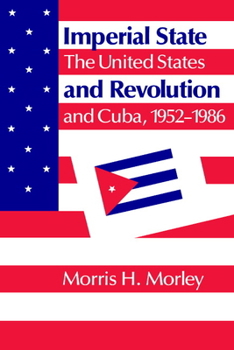Imperial State and Revolution: The United States and Cuba, 19521986
Select Format
Select Condition 
Book Overview
The United States played a decisive role in Cuba's political and economic development during the first half of the twentieth century. The emergence in the 1950s of a broad-based opposition movement to the Batista dictatorship was viewed by American policy makers as a threat to American interests. The paramount concern of the Eisenhower administration was to deny political power to the Castro forces, a goal pursued by all means short of direct military intervention. Subsequently, American policy toward Cuba, as Morris Morley shows in this book, has focused on reasserting US influence over the island. Drawing on personal interviews, classified documents obtained through the Freedom of Information Act, and other primary sources, this study presents the most comprehensive analysis to date of the Kennedy and Johnson administrations' efforts to isolate Cuba politically within Latin America and economically throughout the capitalist world. During the Nixon, Ford, and Carter presidencies, as Morley shows, the global economic blockade unraveled, as did Cuba's political pariah status in Latin America. The book also traces the responses of the US Congress and the American business community to White House policy in the 1970s. In the epilogue, Morley discusses the Reagan administration's antagonistic policies toward Havana, which recalls the policies, rhetoric, and instrumentalities displayed by Washington during the early 1960s.
Format:Paperback
Language:English
ISBN:0521357624
ISBN13:9780521357623
Release Date:January 1988
Publisher:Cambridge University Press
Length:584 Pages
Weight:1.95 lbs.
Dimensions:1.4" x 6.1" x 9.0"
Customer Reviews
1 rating
Excellent view of U.S. foreign policy
Published by Thriftbooks.com User , 21 years ago
While Americans typically recoil at the notion that there exists an American Empire, Morris Morley provides an excellent framework for viewing U.S. actions, particularly towards Cuba. While many readers might challenge Morley's assumptions, it is hard to fight with his logic. Defined as "a state with boundaries for capital accumulation located far beyond its geographic limits" (imperialism and neoimperialism), Morley suggests that the Imperial State depends on an integration of government and business.





